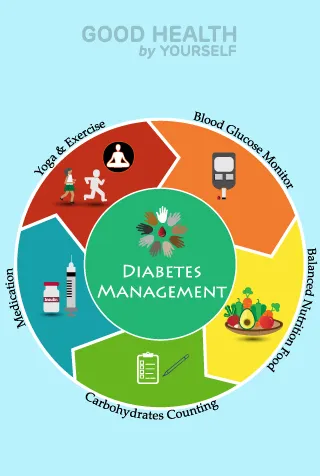Prevent Diabetes: Easy Tips
Key Highlights
- Diabetes can silently wreak havoc on the body without you realising it.
- A diabetic diet is actually just a healthy-eating plan that's naturally rich in nutrients.
- Little changes in your daily life can go a long way in managing diabetes.
- Continually monitoring blood glucose levels is key to effective diabetic management.
High blood sugar levels can do multiple damages to the body without you realising it. With diabetes on the rise worldwide, the best way to prevent diabetes-related problems is to manage your blood sugar levels, and keep them in check.
If you happen to get diagnosed with the D-word, here's what you can do.
The right foods for diabetic individuals
Whether you are pre-diabetic, have been diagnosed with type 2 diabetes or have a family history of the disease, it is never too soon, or too late, to make changes to your diet.
A diabetes diet is actually really just a healthy-eating plan that's naturally rich in nutrients, whilst sticking to regular meal times.
Taking an active role to manage your blood sugars, weight and control risk factors for heart disease will not only help to prevent (even reverse) diabetes but also improve your overall health and wellbeing.
I am diabetic, what can I eat?
- Fresh fruits and vegetables: Ensure a range of colours and eat whole rather than juices. Smoothies and soups are great as you keep all the blood sugar balancing, colon friendly fibre.
- Healthy fats: Get healthy fats from soaked nuts and seeds, oily fish, extra virgin olive oil, virgin coconut oil, avocadoes and grass-fed butter or ghee.
- High quality protein: Wild caught fish, organic poultry and their eggs, low-fat organic dairy and yoghurt, occasional grass-fed red meat, acid-soaked beans and pulses.
- Whole grains: Though you should reduce grains as much as is possible, when you occasionally do enjoy them, make sure they are whole grain and acid-soaked to increase their nutrient value and decrease phytic acid.
What should be off a diabetic individual's eating list?
- Packaged and fast foods: Particularly, high-in-sugar-like biscuits, baked goods, sweets and desserts.
- Trans fats: Partially hydrogenated or deep-fried foods, margarine, vegetable oil, soya oil and any refined oils in clear plastic bottles.
- Processed and cured meats: Bacon, ham, salami, chorizo, prosciutto and mortadella.
- White bread and white flour products: Crackers, cakes, refined pasta and white rice, processed cereals.
- Beware of 'low-fat' products: Foods that have added sugar (eg. fat-free yoghurt) and 'sugar-free' products that are full of artificial sweeteners like aspartame.
Effective lifestyle management: small changes, big results
Obesity and lack of physical activity lead to and make diabetes worse. Weight loss can improve control or reverse type 2 diabetes.
Studies have shown that moderate and sustained weight loss (5%-10% of the body weight) can improve insulin action, decrease fasting glucose concentrations and reduce the need for some diabetes medications.

You don't need to drastically overhaul your life to achieve some serious weight loss success. Small steps add up to make a big difference, both in the health and weight. Here's what you could do:
- Plan ahead: Create weekly meal plans and don't forget to account for snacks. Schedule exercise appointments to keep yourself accountable.
- Balance calories: Creating a deficit of 500-1,000 calories per day will result in a one to two-pound weight loss per week.
- Maintain a food journal: Writing down the food, portion size and calorie amount helps increase awareness and will help you assess your calorie intake objectively.
- Eat more fibre: Increasing the amount of fibre in your diet will help both diabetes and obesity. A high intake of soluble fibre will improve glycaemic control in patients with type 2 diabetes. Additionally, high-fibre foods help keep weight off longer by creating a sense of abdominal fullness between meals.
- Drink more water: Ditch the fizzy but drink enough water. Many times, we mistake thirst for hunger. Sip on water throughout the day.
- Cut down the TV time. Even if you lessen it by 30 minutes each day and use that time for a walk or light jog, it will help maintain your weight loss and prevent regain. It will also improve insulin sensitivity and glycaemic control.
For those who have diabetes, exercise is imperative. It can improve your sensitivity to insulin and help you build muscle and shed excess fat, all of which will keep your diabetes under control.
If you are overweight or have a history of heart disease, or if you have diabetic neuropathy have a complete physical exam before beginning a new exercise routine.
Did you know? Sleep can affect your sugar levels
Sleep is increasingly recognised as an important factor in health, alongside nutrition and exercise.
Research shows that there is a link between short sleep duration with a disruption of the circadian rhythm and a higher risk of metabolic syndrome and diabetes. According to a study by University of Arizona Health Sciences sleep researchers, night-time snacking and junk food cravings are associated with an increased risk for diabetes.
They have also found that poor sleep quality seems to be a major predictor of junk food cravings, and that junk food cravings are associated with a greater likelihood of obesity, diabetes and other health problems.
De-stress for better sugar level management!
Stress impacts our eating behavior. Continual high levels of cortisol during chronic psychological stress can increase appetite and lead to weight gain. People also tend to store more abdominal fat.
For people living with insulin deficiency and /or resistance, chronic stress can make glycemic control even more challenging. In addition, stress can cause a detour in the best laid plans to eat healthier and exercise more.

Says a 2009 report in the journal 'Current Opinion in Endocrinology, Diabetes & Obesity', chronic stress may be a contributor to the increased risk for obesity, especially upper body obesity, and other metabolic diseases.
Conclusion
The American Diabetes Association recommends routine screening with diagnostic tests for type 2 diabetes for all adults age 45 or older and for the following groups:
- People younger than 45 who are overweight or obese and have one or more risk factors associated with diabetes.
- Women who have had gestational diabetes.
- People who have been diagnosed with prediabetes.
- Children who are overweight or obese and who have a family history of type 2 diabetes or other risk factors.
Share your concerns about how to prevent diabetes with your doctor. He or she will appreciate your efforts to prevent diabetes and may offer additional suggestions based on your medical history or other factors.
Did you like our Article?
Excited
0
Happy
0
Not Sure
0
Silly
0
2 Comments
Leave a Comment
- CDC: Diabetes Basics
- Mayo Clinic: Diabetes
- Mayo Clinic: Type 1 diabetes in children
Our team of experts frequently monitors developments in the health and wellness field, and we update our articles when new information becomes available.
Current Version
Dec, 01 2023
Written By
Reshma Pathare
Annie Ombayan
Sun, 06 August 2023, 8 months agoVery interesting and informative article thank you
Replylucy kwanya
Thu, 24 November 2022, 1 year agoIam diabetec/preasure/Athiritis.
ReplyGHBY Team
Thu, 05 January 2023, 1 year agoWe hope you find our blogs on heart health, diabetes, and arthritis helpful in managing your condition.
Reply